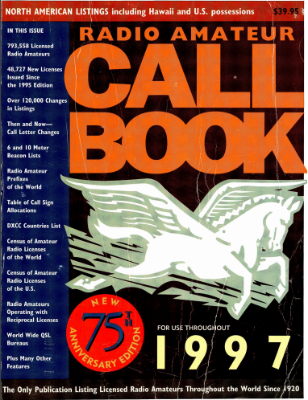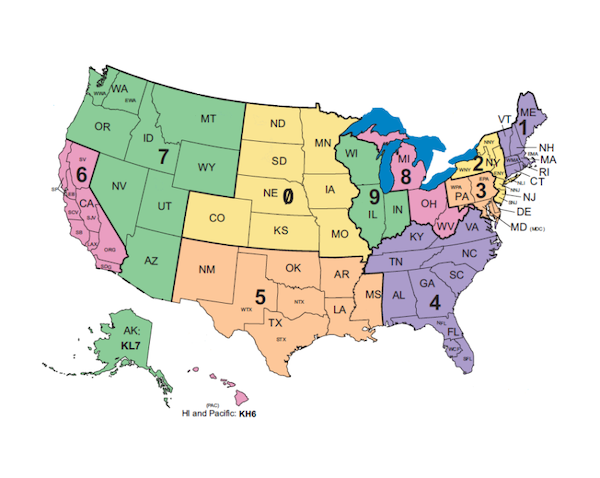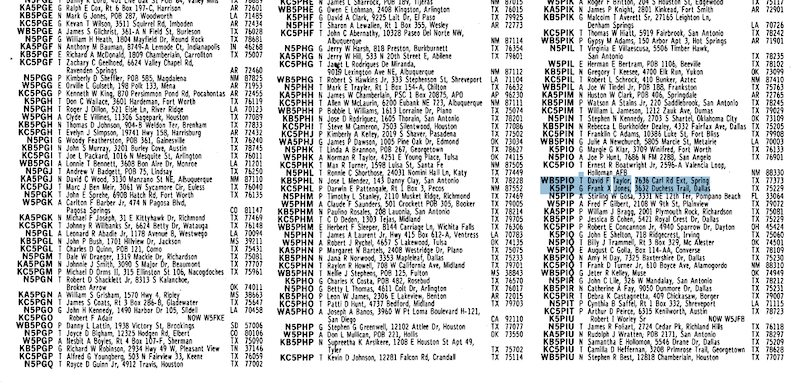The following article was written by a guest author and newsletter reader, David Taylor. He is also known in ham radio circles as WB5PIO:
Amateur Radio and Genealogy
A surprising resource by David Taylor.
Did you know that amateur radio operators have a resource that can be used for genealogy research? Their resource is valuable for finding addresses between censuses especially if they moved around a lot. They had a book that was published every year from 1913 to 1997 and listed the call sign, license class, operator’s name, and address of their radio station. Almost all amateur radio operators or Hams as they are known have their stations in their homes or somewhere on their residential property. The address that was published in the book had to be the actual location of the radio station and it had to be current. If you have someone in your family that was an amateur radio operator and they moved and you can’t find them, you now have another way to look for them.
 The Radio Amateur Callbook is available for download or viewing from https://archive.org/advancedsearch.php. You can view or download all of the books from 1913 to 1997 free of charge. When you use the link shown above type Radio Amateur Callbook in the title field, change “all media types” to texts and press search. On the page that comes up hover your mouse over the tab Date Archived and select Date Published.
The Radio Amateur Callbook is available for download or viewing from https://archive.org/advancedsearch.php. You can view or download all of the books from 1913 to 1997 free of charge. When you use the link shown above type Radio Amateur Callbook in the title field, change “all media types” to texts and press search. On the page that comes up hover your mouse over the tab Date Archived and select Date Published.

This will sort all of the books by date from newest to oldest. Select the book you wish to view and you will be taken to the next screen. You can view the pages by clicking on the page that is open at the top of the screen and browse through the section that is displayed, if you can read it. I can’t because the type is too small. A better way is to scroll down to the area for download options and select PDF. This will give you the option of selecting a district to view. The callbook is arranged by districts as shown in the map. Looking at the map, look for the state your family member lived in and find the corresponding district number. After you find the district number simply download the appropriate pdf and you will be able to view the pages in a type size that is easy to read and/or save the file to your computer. Adobe Reader and Adobe Acrobat can search most of the books that have been scanned by achive.org. Select edit and scroll down to advanced search in your pdf program and type in the name of the family member you are looking for. You must enter a name exactly as it appears in the callbook or your search will not produce any results. Most amateur radio operators use their middle initial in the listing. You can search by name, call sign, city or street. Once you find your family member in one listing it is then very easy to search all of the callbooks and compare addresses where they have resided while they were an amateur radio operator. Sometimes a search will provide no results even though you are searching for someone that is in the book exactly as you are searching for them. This is because the scanning process does not always scan one line at a time. Sometimes it scans two lines and the search can only scan one line and so you do not get any results. In this case you will have to manually search through the pages to find what you are looking for. As an example I searched for myself David F Taylor (don’t use a period after the initial) in the 1997 callbook. It returned no results. I knew I was in the book so I manually scrolled through the pages until I came to WB5PIO which is my call sign. When I tried to highlight my listing I could only highlight two lines instead of one which is why the search would not work. Do not get discouraged because once you find your family member and obtain their call sign it is very easy to look through the pages of all of the books to obtain their addresses. It is important to note that the call signs are arranged alphabetically by the letters following the district number. See the example below.

In the example shown above you can see that I was not able to select just my listing which is why the search did not work. However the search did work in most of the other books. Also note how the listings are sorted. For example: K5PIO, N5PIO, KC5PIO and finally mine WB5PIO. Then comes K5PIP, N5PIP, W5PIP, KA5PIP, KB5PIP, and KC5PIP. Also note that sometimes amateur radio operators change their call signs. See the red arrow above. If this was your family member you would now have to go to the area where FKE is located to see his address.
I had an uncle whose call was WA0FZS. I first found him in the callbook in 1964. The last time I found his call sign was in 1982. Then I made a search for Francis D Baumann and discovered that he had changed his call sign to N0EEL. The callbook did not give me notice that he had changed it. Sometimes they do and sometimes they don’t. When you are searching by call sign and you no longer find it be sure to do a name search. After continuing to search the callbooks I found every address that he had lived at up until his death in 2005. My genealogy profile on him just became more complete thanks to the Radio Amateur Callbook.
Do you have ancestors that were Amateur Radio Operators? This might be the answer to that brick wall problem that you have.
This original article was created by David Taylor and used information from the Radio Amateur Callbook as well as information from the American Radio Relay League, Inc. of which David is a Life Member. David has been a Ham since 1976 and currently holds a General License.
 Latest News Articles
Latest News Articles If you do not see a Plus Sign that is labeled "Add comment," you will need to upgrade to either a (FREE) Standard Edition or a (paid) Plus Edition subscription
If you do not see a Plus Sign that is labeled "Add comment," you will need to upgrade to either a (FREE) Standard Edition or a (paid) Plus Edition subscription